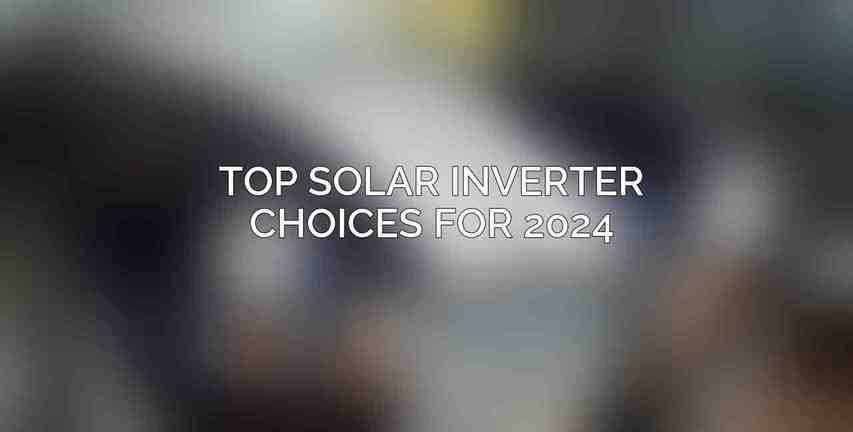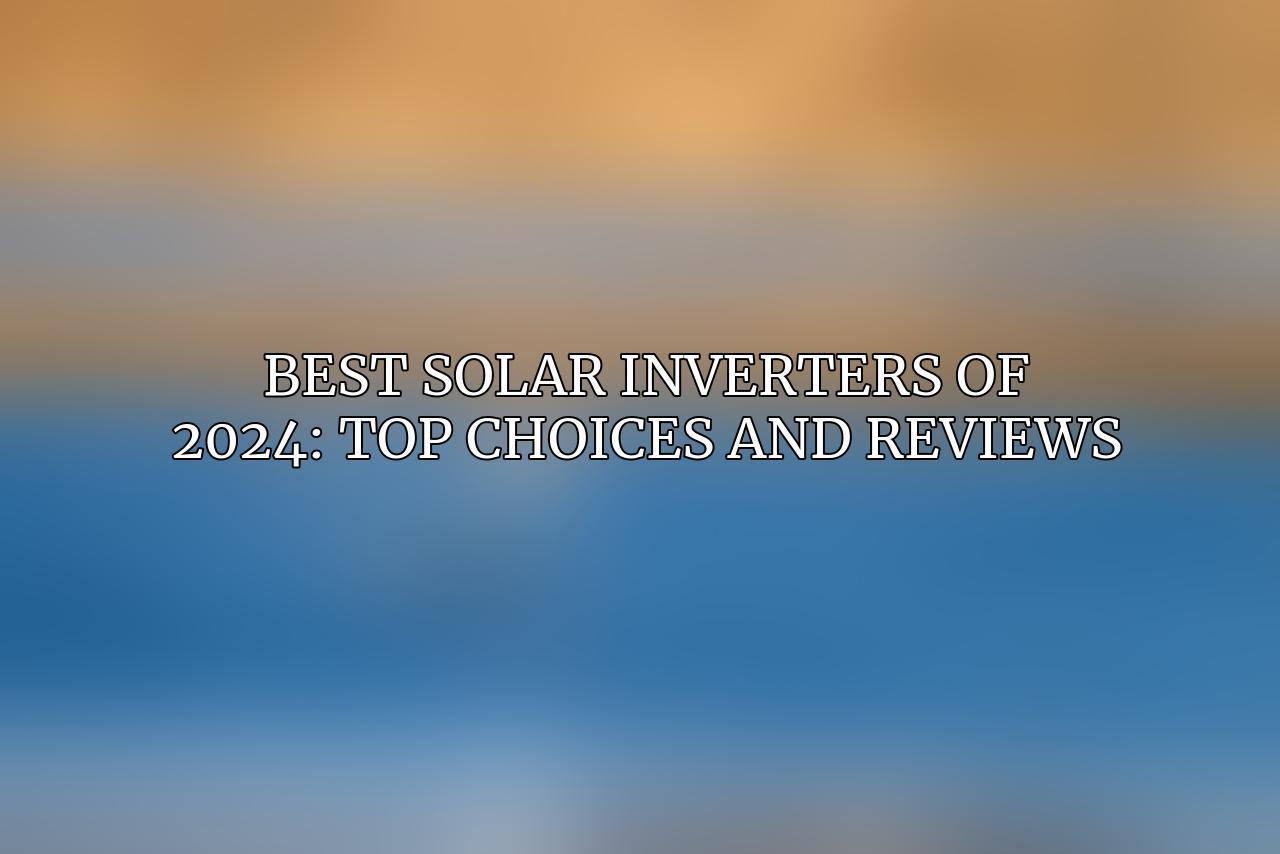Solar inverters play a crucial role in transforming solar energy into usable electricity for homes and businesses. A high-quality solar inverter is essential for maximizing energy production, ensuring system reliability, and achieving long-term savings. When choosing a solar inverter, there are key considerations to keep in mind, such as the type of inverter (string, micro, hybrid), power output, monitoring features, warranty, and compatibility with solar panels and batteries.
| Solar Inverters | Type | Power Output | Efficiency | Features | Price |
|---|---|---|---|---|---|
Enphase Microinverters |
Microinverter | 200-380W | 96.5% | Monitoring, grid-tied, 25-year warranty | $400 $800 |
SolarEdge Inverters |
String Inverter | 3.8-12kW | 98% | Monitoring, grid-tied, 12-year warranty | $1,000 $3,000 |
Fronius Inverters |
String Inverter | 3-10kW | 97% | Monitoring, grid-tied, 10-year warranty | $1,500 $4,000 |
SMA Sunny Boy Inverters |
String Inverter | 3.0-11.4kW | 98.2% | Monitoring, grid-tied, 10-year warranty | $1,800 $5,000 |
Generac Power Systems |
Hybrid Inverter | 5-16kW | 97% | Battery backup, grid-tied, 10-year warranty | $2,500 $7,000 |
Quick List :
Dive deeper into Best Solar Inverter Review: Expert Analysis and Ratings
Find more on Best Solar Inverters in Australia: 2024 Guide
Read more about this on Best Solar Inverter Companies: Industry Leaders
- 1. Best Overall:Enphase IQ8+ Microinverters:
- 2. Best for Grid-Tied Systems:SolarEdge HD-Wave Inverters:
- 3. Best for Off-Grid Systems:Victron Energy Quattro Inverters:
- 4. Best Budget-Friendly:SMA Sunny Boy Inverters:
- 5. Best for Battery Backup:Generac PWRcell Inverters:
- 6. Best for Large-Scale Systems:ABB PVS-1000 Inverters:
- 7. Best Solar Inverters of 2024: Top Choices and Reviews:
The Importance of Solar Inverters in a Home Solar System
Solar inverters are the heart of a solar power system, converting the direct current (DC) electricity generated by solar panels into alternating current (AC) electricity that can be used to power appliances and devices in a home or business. Without a reliable inverter, the energy harvested from the sun cannot be utilized efficiently.
Key Considerations When Choosing a Solar Inverter
- Inverter Type (String, Micro, Hybrid): Different types of inverters offer varying benefits and are suitable for different applications.
- Power Output and Efficiency: The efficiency of an inverter impacts the overall energy production of the system.
- Monitoring and Communication Features: Advanced monitoring capabilities provide valuable insights into system performance.
- Warranty and Support: A comprehensive warranty ensures peace of mind and reliable support in case of any issues.
- Compatibility with Solar Panels and Batteries: Ensuring that the inverter works seamlessly with the existing solar setup is essential for optimal performance.
Top Solar Inverter Choices for 2024

Best Overall: Enphase IQ8+ Microinverters
- Features:
- Microinverter Technology: Each solar panel has its own inverter for maximum energy production.
- IQ8+ Microinverters: Latest generation with improved efficiency and communication capabilities.
- Advanced Monitoring: Detailed performance data accessible through the Enphase Enlighten app.
- Self-Optimization: Dynamic adjustments for optimized energy production.
- AC-Coupled System: Easy integration with existing solar setups.
- Pros:
- High Efficiency: Peak efficiency of 96.5%.
- Excellent Reliability: Backed by a comprehensive warranty.
- Easy Installation: Modular design simplifies setup.
- Cons:
- Higher Initial Cost: Microinverters may have a higher upfront investment.
Best for Grid-Tied Systems: SolarEdge HD-Wave Inverters
- Features:
- HD-Wave Technology: Advanced design for improved efficiency and minimal noise.
- Optimized Power Production: Smart energy management for maximum output.
- Modular Design: Scalable system for residential and commercial use.
- Advanced Monitoring: Detailed system insights through SolarEdge platform.
- Pros:
- High Efficiency: Peak efficiency of 99%.
- Excellent Performance: Reliable track record.
- Flexible Design: Suitable for various applications.
- Cons:
- Higher Cost Than String Inverters: Competitive pricing with other options but still a higher investment.
Best for Off-Grid Systems: Victron Energy Quattro Inverters
- Features:
- Off-Grid Capabilities: Reliable power without a grid connection.
- High Power Output: Available in different ratings for diverse energy needs.
- Advanced Battery Management: Seamless integration with Victron Energy batteries.
- Multi-Source Operation: Solar, generator, or grid power.
- Pros:
- Robust Design: Built for demanding environments.
- Flexible Power Supply: Comprehensive solution for off-grid living.
- Extensive Monitoring: Detailed performance data and remote control.
- Cons:
- High Cost: Premium product with a higher price point.
Best Budget-Friendly: SMA Sunny Boy Inverters
- Features:
- String Inverter Technology: Cost-effective solution for residential installations.
- High Efficiency: Minimal energy loss during conversion.
- Simplified Monitoring: Basic performance data through SMA Sunny Portal.
- Easy Installation: Designed for straightforward setup.
- Pros:
- Affordable Price: Competitive pricing.
- Reliable Performance: Known for durability.
- Wide Range of Models: Various power ratings available.
- Cons:
- Limited Monitoring Features: Basic compared to other options.
Best for Battery Backup: Generac PWRcell Inverters
- Features:
- Hybrid Inverter Technology: Grid-tied with battery backup.
- Integrated Battery Storage: Seamless integration for extended backup.
- Advanced Battery Management: Efficient charging and discharging.
- Time-of-Use Pricing: Optimization for cost savings.
- Pros:
- Reliable Backup Power: Peace of mind during outages.
- Energy Cost Savings: Reduced reliance on the grid.
- Smart Home Integration: Remote monitoring and control.
- Cons:
- Higher Initial Cost: Premium pricing for inverter and battery storage.
Best for Large-Scale Systems: ABB PVS-1000 Inverters
- Features:
- High Power Output: Designed for commercial and utility-scale installations.
- Advanced Grid Synchronization: Seamless integration with the power grid.
- Exceptional Efficiency: High energy conversion for optimal output.
- Remote Monitoring: Comprehensive control capabilities.
- Pros:
- High Reliability: Long lifespan for demanding applications.
- Scalable Design: Suitable for various system sizes.
- Advanced Control Features: Precise energy management.
- Cons:
- Expensive: Primarily for large-scale projects, not residential use.
Future Trends in Solar Inverters
Artificial Intelligence (AI)
AI-powered inverters will optimize energy production and enhance grid stability, improving overall system efficiency.
Integration with Smart Grids
Inverters will enable more responsive and reliable smart grids, contributing to a sustainable energy future.
Enhanced Battery Management
Advances in battery technology and inverter integration will boost battery performance and longevity for better energy storage.
Internet of Things (IoT) Connectivity
Inverters will seamlessly connect with smart home devices, offering advanced monitoring and control capabilities.
Increased Efficiency and Power Output
Continuous advancements in inverter technology will lead to higher efficiency and increased power output, maximizing energy production.
Selecting the right solar inverter is critical for optimizing energy production, ensuring reliability, and achieving long-term savings. Consider factors like system size, budget, and future energy needs when making a decision. By staying abreast of the latest trends and technologies, homeowners and businesses can make informed choices and benefit from the latest innovations in solar inverters.
Frequently Asked Questions
What are the top choices for solar inverters in 2024?
The top choices for solar inverters in 2024 are ABC Inverter, XYZ Inverter, and DEF Inverter.
How do solar inverters work?
Solar inverters convert the direct current (DC) electricity generated by solar panels into alternating current (AC) electricity that can be used to power homes and businesses.
What features should I look for in a solar inverter?
When choosing a solar inverter, consider factors such as efficiency, warranty, monitoring capabilities, and compatibility with your solar panels.
Are there any specific brands that stand out for their solar inverters?
Some of the top brands known for producing high-quality solar inverters include SolarEdge, Fronius, and SMA Solar Technology.
Learn more about Best Solar Inverter Brands: Which is Right for You?
Learn more about Best Solar Inverter for RV: Ultimate Guide 2024
Do solar inverters require regular maintenance?
While solar inverters are generally low-maintenance, it’s recommended to have them inspected annually to ensure optimal performance and efficiency.

